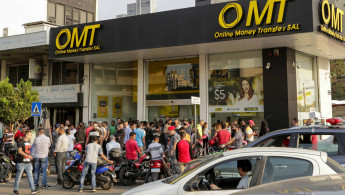Lebanon's Hariri appeals for foreign aid to tackle economic crisis, as France rallies funds
Lebanon asked for credit lines from the United States, France, Russia, Saudi Arabia, Egypt, Turkey, China and Italy, a statement from Hariri's office said.
The appeal was part of an effort "to address a liquidity crisis and secure basic imports" and was critical to preserving food security, the statement added.
Meanwhile, France plans to hold a meeting of an international support group for Lebanon on 11 December in order to raise financial assistance for the protest-hit country, a Lebanese government official announced on Friday.
A European official added that invitations had been sent out for next Wednesday's meeting in Paris, with Saudi Arabia and the United Arab Emirates among those expected to attend.
"It is a meeting to attempt to mobilise assistance to help Lebanon deal with the acute crisis that it is facing," the Lebanese official said.
Since 17 October, Lebanon has been rocked by anti-government protests railing against corruption and mismanagement that triggered a protracted lockdown and prompted the cabinet to resign.
Political paralysis amid the ongoing demonstrations has aggravated a dollar liquidity crisis that since September has seen banks limit dollar withdrawals and transfers.
With banks failing to provide sufficient dollars, the greenback is selling for more than 2,000 Lebanese pounds on the parallel market for the first time since it was officially pegged at 1,507 in 1997.
Importers of fuel, medicines and wheat warn of shortages if the situation persists.
Petrol station owners have already staged strikes, and hospitals have threatened to stop admitting patients, fuelling public panic.
Twitter Post
|
To ease the crisis, the central bank said in October it would facilitate access to dollars at the official rate for importers of fuel, wheat and medicine.
Other sectors have struggled to obtain hard currency for imports however, with banks capping dollar withdrawals at $500 a week.
President Michel Aoun said on Friday the economy and finance would be among the main priorities of the next government, which is yet to be appointed.
The formation of a new cabinet, the embattled president said, would encourage donors to unlock an $11 billion aid package pledged at a conference dubbed CEDRE held in Paris in April 2018.
Parliamentary consultations to select the cabinet are scheduled to start on Monday.
Even before protests began, economic growth had stalled following repeated political deadlocks in recent years.
The economic malaise was also compounded by the war in neighbouring Syria.
Public debt has reached more than $86 billion, over 150 percent of GDP, according to the finance ministry.
The World Bank has warned of an impending recession that may see the proportion of people living in poverty climb from a third to half the population.
Unemployment, already above 30 per cent for young people, would also increase, it has said.
Read more: Suicide epidemic sweeps Lebanon amid economic downturn
In the span of a week over 60 companies notified the labour ministry of plans to lay off employees, caretaker minister Camille Abousleiman told LBC television on Friday.
The union of restaurant and bar owners has said that 265 establishments have closed since the protests began in early October, and warned that this figure could rise to 465 by the end of the year.





 Follow the Middle East's top stories in English at The New Arab on Google News
Follow the Middle East's top stories in English at The New Arab on Google News
![Netanyahu furiously denounced the ICC [Getty]](/sites/default/files/styles/image_330x185/public/2024-11/GettyImages-2169352575.jpg?h=199d8c1f&itok=-vRiruf5)
![Both Hamas and the Palestinian Authority welcomed the ICC arrest warrants [Getty]](/sites/default/files/styles/image_330x185/public/2024-11/GettyImages-2178351173.jpg?h=199d8c1f&itok=TV858iVg)
